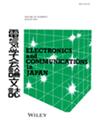Electrical conductivity measurement using a microfluidic chip and evaluation of vsiscosity by Walden's rule
IF 0.4
4区 工程技术
Q4 ENGINEERING, ELECTRICAL & ELECTRONIC
引用次数: 0
Abstract
In this study, the electrical conductivity of low-volume samples was measured using a prototype microfluidic chip with electrodes. We were able to show the difference of electrical conductivity in the samples of saline solution (0.9w/v% NaCl solution) with sucrose. The correlation between the electrical conductivity and the viscosity evaluated by the capillary method was shown. This correlation was shown that it is possible to evaluate viscosity based on the Walden's rule with our chip.
用微流控芯片测量电导率并用Walden规则评价粘度
在这项研究中,使用带有电极的原型微流体芯片测量了低体积样品的电导率。我们能够显示含蔗糖的盐水溶液(0.9w/v%NaCl溶液)样品的电导率差异。显示了通过毛细管法评估的电导率和粘度之间的相关性。这种相关性表明,可以使用我们的芯片基于Walden规则来评估粘度。
本文章由计算机程序翻译,如有差异,请以英文原文为准。
求助全文
约1分钟内获得全文
求助全文
来源期刊

Electronics and Communications in Japan
工程技术-工程:电子与电气
CiteScore
0.60
自引率
0.00%
发文量
45
审稿时长
6-12 weeks
期刊介绍:
Electronics and Communications in Japan (ECJ) publishes papers translated from the Transactions of the Institute of Electrical Engineers of Japan 12 times per year as an official journal of the Institute of Electrical Engineers of Japan (IEEJ). ECJ aims to provide world-class researches in highly diverse and sophisticated areas of Electrical and Electronic Engineering as well as in related disciplines with emphasis on electronic circuits, controls and communications. ECJ focuses on the following fields:
- Electronic theory and circuits,
- Control theory,
- Communications,
- Cryptography,
- Biomedical fields,
- Surveillance,
- Robotics,
- Sensors and actuators,
- Micromachines,
- Image analysis and signal analysis,
- New materials.
For works related to the science, technology, and applications of electric power, please refer to the sister journal Electrical Engineering in Japan (EEJ).
 求助内容:
求助内容: 应助结果提醒方式:
应助结果提醒方式:


